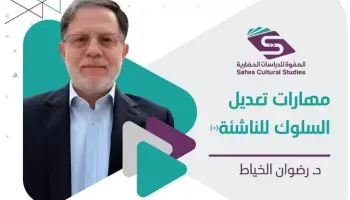


- Home
- Spotlights
- Until They Change What Is in Themselves
Until They Change What Is in Themselves
- Views: 3496


Until They Change What Is in Themselves
This title refers to the Verse of the Qur’an: “inna llaha ..g..bi’anfsihim;” ( )
We do find in the Muslim World young people who are prepared to sacrifice their lives and offer their money for the sake of Islam; but few are prepared to devote years of their lives to earnestly study a problem like that of the discrepancy between a Muslim’s faith and behavior. This is when such a question, and many others, must be thoroughly investigated for the change to take place; and no answers may be obtained without diligent study. The fact is that the Muslim world still does not trust the importance of a diligent study of problems to get at solutions for them.
We do very passionately wish to see changes in our situation; but we do not realize that our problems boil down to have their origin in what is settled in our souls and minds. From this, it will be clear that we are responsible for what happens to us: this indeed what both the Qur’an teaches us and what history teaches us. One of the first steps is to view our problems as subject to laws, ‘sunan’ in Qur’an’s terms, and, in are hence solvable – we do not mean that all Muslims fully believe in change or do not believe in it at all: there are many grades between the two extremes.
The idea here is that there are two aspects to our discussion: that our problem has a solution; and that the solution comes through our understanding of the relevant laws, and adopting them for solving the problem: God has willed that laws, or ‘sunan’ are there to obey humans, as the Qur’an teaches us: “wa sakhkhara ..g..l’ard;” ( ) – on condition that they understand those laws.
Problems of the souls and culture are more difficult than those of the body
It is true that people have gone a long way in successful dealing with the problems of the body and its diseases, viewing them as governed by laws that can be studied and employed; but we have not gone a long way in dealing with our society’s problems as governed by laws, as confirmed as those of the body, laws that may be investigated and employed. This is why Muslims make do by accounting for the Ummah’s affairs as being governed by destiny: Yes, they are governed by destiny, but destiny controls all events, whether we get to know the relevant law or not: Destiny is not an obstacle that prevents us from dealing with events, and with our psychological, social and cultural conditions competently and efficiently – and that is what we learn from the change in our dealing with many events of the world and with the organic diseases.
If we watch the society’s problems, such as the pervading discord, the failure to undertake common social activities, and the elite’s evading to bear the responsibility for their behaviors: such failings or diseases are amenable to study and investigation and treatment. Once we digest this basic rule our effort becomes systematic and exact – in the same way as you see the physician orders several analyses and tests, well designed to reveal the disease, and then to determine the treatment. This applies to the society’s failings and drawbacks.
Similarity between the features of culture and society and those of the body
The Messenger, peace be upon him, pointed out the affinity between the drawbacks of culture and society and those of the body; we see this in hadiths like:
“You see the Muslims in their mutual compassion, affection, and care, not different from the body: for when a certain organ of the body is sore, the whole body takes the alarm, and is hit with fever and pain;” (reported by al-Bukhari). This affinity between the life of nations and the life of individuals is also used in the Qur’an: “likulli ummatin ajal;” ( ) for nations and groups go through stages, in the same way as individuals go through stages of life. There are well-know hadiths in which the Prophet, peace be upon him, brings the conditions of a people within our understanding by citing familiar comparisons: now comparing the solidarity that unites a Muslim to another Muslim with the bricks of a wall; and we have the famous example of the ship, where some individuals consider digging a hole in the lower deck so that they do not need to ascend for water.
We have here vital rules and facts about the various aspects of a society or nation; and the laws that govern all that – it is indeed a well-controlled world, and Muslims need most badly this science of the ascent and descent of nations, to go ahead in bringing about the necessary change to the conditions of our Ummah. It is easy enough to imagine what happens to a ship when a hole is dug in its floor, but how much scientific study do we need to perceive the holes in the life of a people, and how to ward that off, or put things right after they have deteriorated.
We may feel temporary rest when we avoid strenuous study of our situations by asserting it is destiny that governs changes and fortunes, but our insisting on not devoting time and effort to investigating things usher in more complication and suffering, and hampers our progress. We certainly need that science which binds objectives, causes, and the human ability: We do have superior ideals, and God has endowed us with ability; and science is waiting for us to help us perceive the links between means and ends. It is our duty to put in the necessary effort to do our share of the equation, and then to pray and hope that God will grant us the better life that we crave – this is indeed what the Verse: “inna llaha ..g.. bi’anfusim” ( ) teaches us.
The Verse mention a law ‘sunnah’ for humans in general, and it is not confined to Muslims
To appreciate the Verse more, and learn its lessons, we need to notice several points about it. One point is that the law it refers to is common to all humans, not confined to Muslims. This is true of all laws: they apply to people from every creed or race – though Muslims are inclined to believe that they are unique, and must have their unique law. Think of the consequences of such a view: when they believe that God’s law ‘sunnah’ that applies to all others does not apply to them, they will not hasten to study history – they could be alerted with the hadith: “You will be following in the steps of the people who preceded you.”
The idea is, then, that the fortunes of Muslims rise or fall, depending on what they bear in their souls: this is true of us, and true of other peoples and nations. The Verse teaches us also that our problem is a human one, a problem of people as people, not a problem of faith and religion – which does not contradict the fact that our faith is the dearest thing in our hands. Yes, we are right to hold on to our faith most tightly, but we need at the same time to get rid of certain illusions and follies: which are given the same sacredness conferred on the Qur’an.
We need to be aware of three things:
We need to know the laws of changing what is in the souls;
To know what illusion we need to change, and the facts that we need to preserve;
Specifying those on whom we need to bring about change on their souls.
All this is essential for any serious work in effecting change.
Let us emphasize that the Verse applies to the problems of a people, not to individuals; and that it describes problems of the society in this world; while on the Day of Judgment accountability is individual: each individual will have to fend for himself/herself: No one will be responsible for another, as we find in such Verses of the Qur’an as, “alla taziru waziratun wizra ukhra;” (alNajm: 39), “wa narithuhu ..g..fardan;” (Maryam:80). This must be clear; and it must be clear, too, that the laws of society apply to groups, societies, as the following Verse of the Qur’an asserts, “wattaqu ..g..khassah;” (alAnfal:25)
Changing what in the souls must come first
We may learn more by reflecting on the Verse – that the Almighty Lord ordained that the change people do to what is in their souls/minds must take place before His changing their conditions. No matter how people dream and crave that change should take place, they will have to first effect their part of the change: this means that the events of history are never separate from the states of souls – change takes place in the contents of souls, and it leads to changes in their fortunes and conditions. Our part, as humans, must focus on changing that which is in the souls.
And when we say that the conditions of a people has changed, as from poverty to wealth, we are not saying that no poor person is left: the law applies to the people as a whole, as a collectivity, and the general wealth of a society does not mean no poverty is left. This is also true of good health and bad health: you see a people in whom good health has become predominant, more than certain other societies; but that does not mean the absence of poverty. This is also true of a nation’s high status or humble status: a nation rises in status, in a general way, in correspondence to the contents of what is in their souls.
What must we change?
This must occur to one: What is it in the souls that must be changed? And the answer is that we have a big range of things that is there in the souls: it encompasses ideas, concepts, and doubts, and it encompasses both the conscious and the subconscious. This might be what the genius Ibn Khaldun meant when he said there is the visible history and the internal history.
In the same way, what the Almighty is referring to when He mentions changing the condition of a people encompasses many aspects of life: wealth versus poverty; good health versus ill health; high status versus low status; efficiency versus inefficiency; and so on.
When our young people do not understand the above rules of change, they must feel frustrated; and they may well seek violent action to bring about change: and this destroys rather than builds.
We must be most certain that God never breaks His promise: whenever a people change that which is in themselves, from what is correct to what is incorrect; or from what is incorrect to what is correct, God will be sure to bring change to their conditions corresponding to the change in their souls: improving their condition or bringing it lower. The Qur’an makes it clear that humans do have the ability to effect change to what is in the soul: “qad aflaha ..g..dassaha;” ( ) you notice how the ‘tazkiyah’ and ‘tadsiyah’ in the Verse is in the hands of the human. A human is born inclined to hold on to truth, and this is the ‘fitrah, the innate nature’ of the human. It does not say that a human is born as Muslim, but is born with this inclination towards truth. But this ‘fitrah’ does not remain pure all the time: culture and environment play their part in bringing in impurities to the human’s ‘fitrah’; and Ibn Taimiyah said something useful about this; he said: “Fitrah might be exposed to certain influences that spoil it and make it less than pure; a human will in that case view false what is true.”
It is then quite hard work to bring fitrah back to its pure condition; to put in the soul proper concepts to replace improper ones; and it is not enough to effect change in the souls of one or some individuals; the proper concepts, ideas, and necessary knowledge required for change must happen to a certain percentage of a community: their condition does change in unison with the change that has taken place in their inner life.
How do we understand people’s rise or decline?
Where should we turn to learn a people’s transforming from a higher condition to a lower condition, or from a lower condition to a higher condition? The Qur’an directs us, for such understanding, to mover around and search in the past and present; we find this in a Verse of the Qur’an like: “qul seeru ..g..lkhalq” (alAnkabut 20). By examining the events of the world, and studying history, how people’s conceptions changed, and this resulted in changes in their visible conditions. We may also wonder and marvel how immense a part humans have been granted by the Great Lord in shaping history: it is when God predicated people’s changing what is in their interior, to the better or to the worse. to bringing about change in their visible condition, and their condition can change to the better or to the worse. It is enormous what has been put in the human beings’ hands; thus we find in another Verse of the Qur’an: “walaqad makkanakum fil ardi;” (alA’raaf: 10). Unless we notice the two kinds of change, the correlation between the change in the souls, consciously or subconsciously, and the change in their material conditions and position in the world, we may not notice how Just and Merciful God is. When you see the Qur’an describing how God granted victory to a certain people but did not support another people, you must not have any doubt that people are responsible for what befalls them: God is for ever Just and Merciful. To illustrate this, we may refer to the Battle of Uhud, when God reminded the Prophet’s Companions that they were not to forget their own responsibility for the defeat; “Qul huwa min indi anfusikum,” the Qur’an said to them (AlUmran: 165). And when we read in the Qur’an that God azagha the hearts of a certain people, and led them astray, we should check for other Verses, where another Verse says that people’s going astray only happened as a result of their previous choosing the way of delusion, “falamma zaghoo azagha Allaahu qulubahum;” (alSaff: 5) God’s laws ‘sunan’ are solid and steady, and they apply to all.
All Categories
Latest scientific illuminations
-
Adolescent behavior modification skills
08-07-2023 -
Ramadan 2023
28-03-2023

Subscribe
You can get latest updates and news by subscribing to our newsletter






